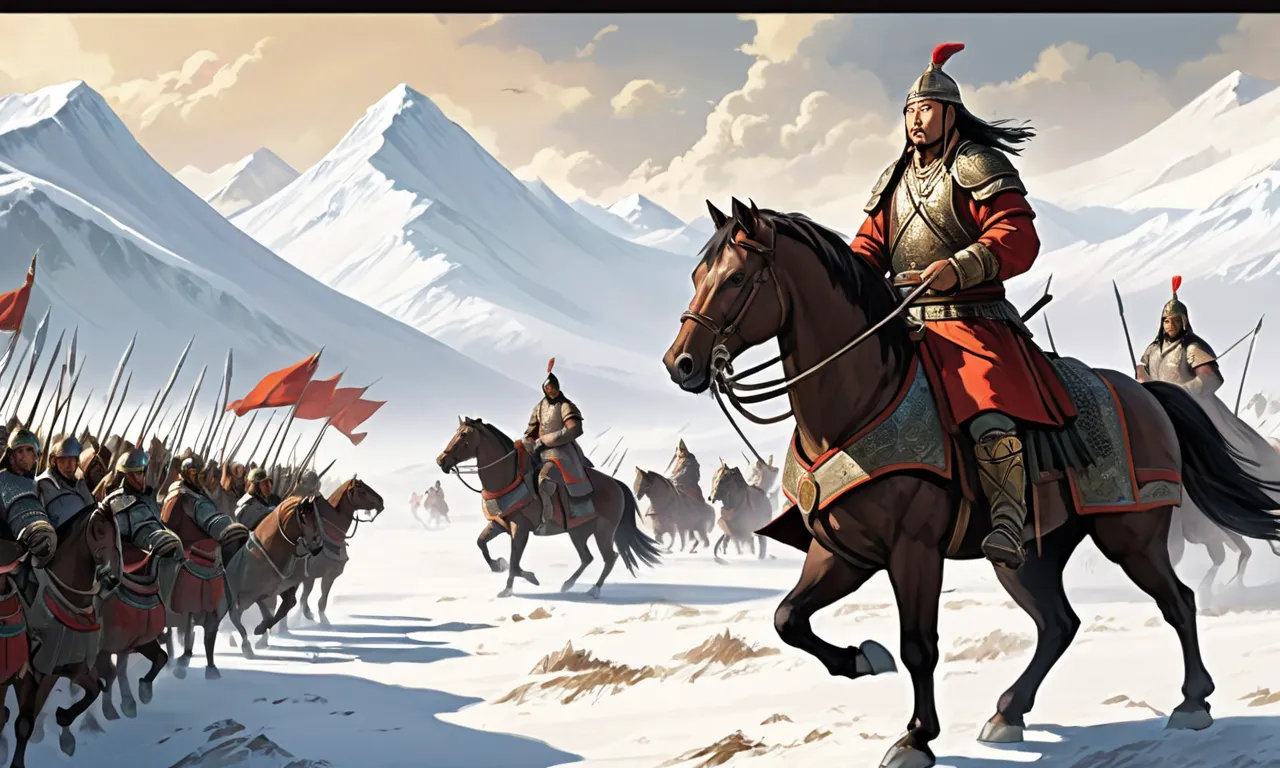Genghis Khan’s Army Dream Meaning

Genghis Khan, born as Temüjin, was a legendary Mongolian warrior who established the largest empire in history. He was known for his military prowess and leadership qualities that led to the expansion of his empire across Asia, Europe, and parts of Africa. His dreams and visions played an important role in shaping his decisions and strategies as a ruler. One such dream that stands out is Genghis Khan’s army dream, which has become a symbol of power and strength throughout history.
The army dream refers to a recurring dream where Genghis Khan saw his forces marching towards him, with each soldier carrying a white banner that had the image of a wolf. This dream is believed to have been a premonition of the immense power and influence he would gain through conquest. In this article, we will delve into the symbolism behind this dream and explore its cultural significance in Mongolian history.
I. The Symbolism Behind Genghis Khan’s Army Dream
Genghis Khan’s army dream is a complex symbol that represents various aspects of his personality and the culture he belonged to. Here are some interpretations of the different elements present in this dream:
The White Banners with the Image of a Wolf: The white banners carrying the image of a wolf are believed to represent Genghis Khan’s Mongolian heritage and connection to the natural world. Wolves are considered powerful and wise creatures in Mongolian culture, embodying qualities such as loyalty, courage, and cunning. These traits were also attributes that Genghis Khan displayed during his reign.
The Marching Soldiers: The soldiers marching towards Genghis Khan in the dream symbolize the vast army he would amass over time. This large force enabled him to conquer territories, expand his empire, and establish a lasting legacy.
The Recurring Nature of the Dream: The fact that this dream recurred throughout Genghis Khan’s life is significant because it indicates his constant focus on power and expansion. It also served as a reminder of the responsibilities he had towards his people and the empire they were building together.
The Cultural Significance of Dreams: In Mongolian culture, dreams are considered sacred and hold profound meanings. They are believed to be messages from the spirit world that can guide an individual’s actions and decisions. By interpreting his army dream, Genghis Khan was able to use it as a source of inspiration and motivation in his quest for conquest.
II. The Cultural Significance of Genghis Khan’s Army Dream
Genghis Khan’s army dream has become an integral part of Mongolian culture and history, symbolizing the power, strength, and unity that defined the Mongol Empire. Here are some ways in which this dream continues to hold significance today:
The Legacy of Genghis Khan: The Mongol Empire under Genghis Khan left a lasting impact on global history, shaping politics, economics, and culture across different regions. The army dream is a reminder of his vision and the achievements he was able to accomplish during his lifetime.
National Pride and Identity: For modern-day Mongolia, Genghis Khan’s army dream represents national pride and identity. It serves as a source of inspiration for future generations, encouraging them to strive for greatness and emulate the values embodied by their ancestors.
The Importance of Unity: The recurring theme of unity in Genghis Khan’s army dream is particularly relevant today, as it underscores the importance of working together towards a common goal. This message resonates with Mongolians who are faced with various challenges and need to unite in order to overcome them.
Spiritual Connection: The spiritual significance of dreams in Mongolian culture also plays a role in how Genghis Khan’s army dream is perceived today. Many people believe that by studying the symbolism behind this dream, they can gain insights into their own lives and aspirations.
III. Conclusion
Genghis Khan’s army dream is more than just a fascinating story from history; it serves as a powerful symbol of Mongolian culture, heritage, and values. By exploring the symbolism behind this dream and understanding its cultural significance, we can gain new insights into the life and legacy of Genghis Khan and his impact on the world. As long as the spirit of Genghis Khan’s vision continues to inspire future generations, his army dream will remain an enduring reminder of power, unity, and resilience.






